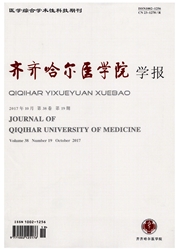

 中文摘要:
中文摘要:
目的探讨盆底功能康复疗法对产后压力性尿失禁的治疗作用。方法选取我院2012年3月至2013年3月自然分娩,产后30~42 d来我院复诊的初产妇1500例为研究对象,以住院号顺序随机分为三组,A组500例、B组500例、C组500例。A组接受电刺激+盆底生物反馈治疗,B组接受电刺激+盆底肌生物反馈+场景生物反馈治疗,C组进行常规产后健康教育,对三组产妇分别进行6、12个月随访,诊断是否存在产后压力性尿失禁,评估治疗方法效果及对预后复发情况。结果 B组产后6个月肌电位值明显高于A组与C组;A组与B组产后12个月肌电位值无明显差异,均高于C组,差异有统计学意义(P〈0.05);A组产后6个月尿失禁程度较B组高,低于C组,差异均有统计学意义(P〈0.05);产后12个月A组与B组尿失禁程度无明显差异,C组高于其他两组,差异有统计学意义(P〈0.05)。结论盆底功能康复疗法对产后压力性尿失禁具有显著治疗作用,应用电刺激+盆底肌生物反馈+场景生物反馈疗法可以提前降低尿失禁程度,改善症状,值得临床推广。
 英文摘要:
英文摘要:
Objective To explore the clinical effect of pelvic floor functional rehabilitation therapy in the treatment of postpartum stress urinary incontinence. Methods 1,500 first-time mothers with natural childbirth who came back for further consultation after 30 ~ 40 days of birth in our hospital from March 2012 to March 2013 were selected as the research object and were randomly divided into three groups according to the order of hospitalization. Patients in group A were treated with electrical stimulation and pelvic floor biofeedback therapy,patients in group B were treated with electrical stimulation and pelvic floor muscle biological feedback + scene of biological feedback therapy and patients in group C were treated with routine postpartum health education. The women in the three groups were followed up for 6 and 12 months to diagnose whether the postpartum stress urinary incontinence existed and evaluated the treatment effect and the prognosis of recurrence. Results Group A of postpartum 6 months of pelvic floor electrical average level was lower than that in group B than in group C; group A and group B after 12 months of pelvic floor electrical average level had no obvious difference was significantly higher than that of group C,the differences were statistically significant( P〈0. 05); The urinary incontinence degree in group A after six months of birth was higher than that of group B but lower than that in group C. The differences were statistically significant( P〈0. 05). The urinary incontinence degree in group A and group B had no significant difference but that in group C was higher than that in other two groups. The difference was statistically significant( P〈0. 05). Conclusions Pelvic floor rehabilitation therapy of postpartum stress urinary incontinence has significant therapeutic effect and the application of electrical stimulation and pelvic floor muscle biological feedback + scene of biological feedback therapy can reduce the degree of urinary incontinence in advance and improve
 同期刊论文项目
同期刊论文项目
 同项目期刊论文
同项目期刊论文
 期刊信息
期刊信息
